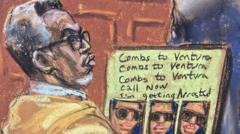The prosecution in Diddy's trial has presented compelling witness testimonies and evidence regarding alleged sex trafficking and racketeering. Yet, uncertainties linger as the defense prepares to mount its case amid complex legal standards.
Diddy’s Trial: Analyzing the Prosecution's Case Amidst Legal Complexities

Diddy’s Trial: Analyzing the Prosecution's Case Amidst Legal Complexities
As Sean "Diddy" Combs’ trial unfolds, substantial testimonies and evidence challenge the music mogul's defense against serious charges.
Prosecutors in New York have concluded their case against rapper Sean "Diddy" Combs in a high-profile trial that examines serious allegations of sex trafficking and racketeering. The 55-year-old artist, known for his influential presence in the music industry, stands accused of exploiting his position to facilitate the sexual exploitation of women, despite pleading not guilty to the charges.
Crucial to the prosecution's argument was the testimony from Cassie Ventura, Diddy's former girlfriend, who detailed an abusive relationship marked by manipulation and coercion. Her account included harrowing stories of being forced into sexual encounters, described as "freak-offs," while raising concerns over substance abuse and violence. Venturas' emotional testimony, coupled with surveillance footage showing an alleged abusive incident, has significantly enhanced the prosecution's narrative.
Legal experts suggest the gravity of the allegations, particularly sex trafficking, carries severe implications, with penalties potentially exceeding a lifetime behind bars. However, complexities arise as the jury views not only the testimony of the victims but also the intimate exchanges and communications that hint at contradictory dynamics in these relationships.
Additionally, the prosecution was dealt a setback when a third alleged victim became unreachable, raising questions about the strength of their multi-testimony strategy. In connection with racketeering, Combs is accused of running a criminal enterprise that enabled his misconduct, and witnesses from within his circle have corroborated these claims of facilitating such activities.
As Diddy's defense prepares to argue their case, their lack of witnesses and the decision not to allow the music mogul to testify has raised eyebrows. Analysts say the strategy aims to sidestep the risks of cross-examination but may also undermine their ability to challenge the prosecution’s compelling evidence.
With jury members brought into the complexities of relationship dynamics, the juxtaposition of affection against allegations of coercion may lead to tenuous deliberations. Legal experts caution that despite the prosecution presenting an impactful narrative, the path to conviction may not be as straightforward due to the intricate legal frameworks at play.
Ultimately, Diddy's trial poses significant questions not only about the specifics of the case but also about broader themes of power dynamics and the complexities surrounding domestic abuse. As the defense takes its turn, the outcome remains uncertain in this pivotal moment for both the artist and the issues of accountability in the entertainment world.






















